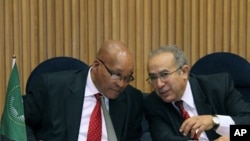The African Union appeared to soften its stance towards Libya's transitional government on Wednesday, but still stopped short of recognizing the group as the country's legitimate leadership.
In a statement released after meeting in South Africa, the Ad Hoc Committee of the African Union said it is committed to working with the National Transitional Council and "all other Libyan stakeholders" to establish an "all-inclusive national unity government."
The African Union has so far rejected calls to recognize the NTC, instead suggesting its own "road map" for political transition in Libya.
On Wednesday, the AU's Libya panel said it welcomed the NTC's commitment to national unity, and supports its desire to bring together all Libyan stakeholders "without exception" to rebuild the country.
The panel also said it plans to work with other regional and international bodies to promote a peaceful transition in Libya.
"The Ad Hoc Committee reiterated its readiness to work with the United Nations, the League of Arab States, the Organization of Islamic Cooperation, the European Union and NATO to ensure a coordinated support to the Libyan people," said Ramtane Lamamra, AU Commissioner for Peace and Security.
The meeting was hosted by South African President Jacob Zuma, who has frequently argued that the United Nations had only given NATO authority to protect airspace over Libya, and not seek the ouster of former Libyan leader Moammar Gadhafi.
At least 20 African countries have individually recognized Libya's new government, despite the AU's refusal to do so.
Wednesday's AU panel on Libya included the leaders of South Africa, Mauritania, Mali, Congo-Brazzaville and Uganda.
Gadhafi was a powerful figure in the African Union during his 42-year rule. He served as its chairman in 2009 and was a chief financial backer. Gadhafi's oil-rich country paid dues that amounted to 15 percent of all contributions made by member states.
African Union Stops Short of Backing Libya's Transitional Government




